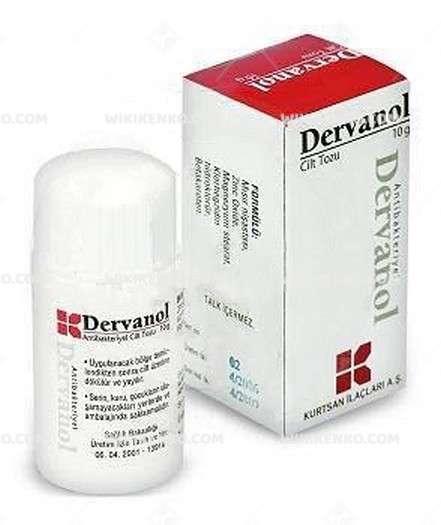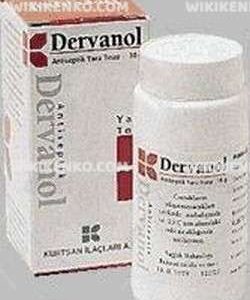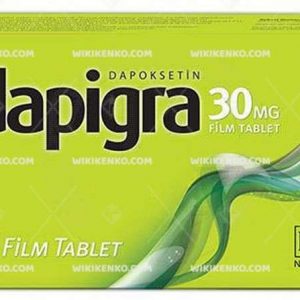Dervanol Antibakteriyel Cilt Powder
In the realm of skincare products, “Dervanol Antibakteriyel Cilt Powder” emerges as a noteworthy contender, often referred to as “Dervanol Yara Tozu” in Turkish. This comprehensive guide delves into its general information and ingredients to its uses, potential side effects, and drug interactions.
| Dosage form | |
|---|---|
| Pack size | |
| Potency | 10G |
| Manufacturer | |
| Origin | |
| Generic Name (Ingredient) | Corn Starch, Zinc Oxide, Magnesium Stearate, Chlorhexidine Hydrochloride, Riboflavin. |
Assuming your emergency circumstances for this product, visit Urgent Quotation page. Besides, for any pharmaceutical questions, please ask us in the comments section.
Description
General Information
| Attribute | Details |
|---|---|
| Primary Use | Skincare |
| Common Name | Dervanol Yara Tozu (in Turkish) |
Dervanol Side Effects
While Dervanol is renowned for its skincare benefits, it’s crucial to be aware of potential side effects. According to available sources, some side effects may include:
| Side Effect | Description |
|---|---|
| Reduced appetite | Decreased desire for food |
| Nausea | A feeling of sickness in the stomach |
| Vomiting | The act of ejecting stomach contents through the mouth |
| Hypotension with dizziness | Low blood pressure leading to lightheadedness |
| Flushing | Redness and warmth of the skin |
| Difficulty in micturition | Problems with urination |
| Urinary retention | Inability to completely empty the bladder |
| Dyspnoea | Shortness of breath |
| Weakness | Lack of physical strength |
| Headache | Pain in the head |
| Disturbances of glucose metabolism | Abnormalities in the body’s sugar regulation |
| Sweating | Excessive perspiration |
| Hypersalivation | Excessive saliva production |
It’s important to note that while these side effects are associated with Dervanol, they may not be specific to “Dervanol Antibakteriyel Cilt Powder” and could apply to “Dervanol” in general.
Demystifying Dervanol’s Ingredients
Understanding the ingredients of Dervanol Antibakteriyel Cilt Powder is vital to assess its suitability for your skincare regimen. Here are the key components:
| Ingredient | Description |
|---|---|
| Betacarotene | A carotenoid that converts into vitamin A in the body |
| Chlorhexidine hydrochloride | A disinfectant and antiseptic used for various purposes |
| Zinc oxide | A mineral with multiple applications in skincare |
Let’s delve deeper into each ingredient:
Betacarotene
Betacarotene is a carotenoid found in plants, imparting vibrant colors to fruits and vegetables. Within the body, it transforms into vitamin A, playing a pivotal role in supporting vision, immunity, cell division, and other vital functions. Notably, betacarotene is generally well tolerated, with a low risk of toxicity. However, extremely high doses exceeding 100,000 IU/day can cause harmless skin discoloration, typically appearing orange. Individuals with diabetes, renal or liver disease, or hyperthyroidism should exercise caution when using betacarotene.
Chlorhexidine Hydrochloride
Chlorhexidine hydrochloride is a versatile disinfectant and antiseptic employed for skin disinfection prior to surgery, instrument sterilization, wound cleaning, and more. While highly effective, it can trigger hypersensitivity reactions in some individuals, potentially related to specific ingredients within Chlorhexidine hydrochloride.
Zinc Oxide
Zinc oxide is a mineral renowned for its diverse skincare applications. It finds utility in managing skin conditions like atopic dermatitis, contact dermatitis, eczema-related itching, diaper rash, and acne. However, like any medication, it may result in unwanted effects.
Dervanol’s Uses
Dervanol Antibakteriyel Cilt Powder finds its niche in skincare. However, precise details about its specific applications are limited. For comprehensive and accurate information about how to leverage its benefits, it is advisable to consult with a healthcare professional or pharmacist. Your trusted medical expert can provide personalized guidance tailored to your skincare needs.
Dervanol Antibakteriyel Drug Interactions
Regrettably, specific information regarding drug interactions with “Dervanol Antibakteriyel Cilt Powder” is not readily available. Drug interactions can influence the efficacy and safety of medications, potentially leading to unexpected side effects or changes in drug potency.
It is essential to understand that even when no interactions are documented, they may still exist. Therefore, a discussion with a healthcare professional is paramount, especially if you are concurrently taking other medications or have underlying health conditions. Such consultations can mitigate the risk of potential drug interactions.
Conclusion
In conclusion, Dervanol Antibakteriyel Cilt Powder, or “Dervanol Yara Tozu,” offers intriguing potential for skincare. While its primary use is clear, understanding its ingredients, potential side effects, and drug interactions is essential for responsible and effective usage. As with any healthcare product, seeking guidance from a healthcare professional ensures the safest and most beneficial skincare journey.
Use the form below to report an error
Please answer the questions as thoroughly and accurately as possible. Your answers will help us better understand what kind of mistakes happen, why and where they happen, and in the end the purpose is to build a better archive to guide researchers and professionals around the world.
The information on this page is not intended to be a substitute for professional medical advice, diagnosis, or treatment. always seek the advice for your physician or another qualified health provider with any questions you may have regarding a medical condition. Always remember to
- Ask your own doctor for medical advice.
- Names, brands, and dosage may differ between countries.
- When not feeling well, or experiencing side effects always contact your own doctor.
Cyberchondria
The truth is that when we’re sick, or worried about getting sick, the internet won’t help.
According to Wikipedia, cyberchondria is a mental disorder consisting in the desire to independently make a diagnosis based on the symptoms of diseases described on Internet sites.
Why you can't look for symptoms on the Internet
If diagnoses could be made simply from a textbook or an article on a website, we would all be doctors and treat ourselves. Nothing can replace the experience and knowledge of specially trained people. As in any field, in medicine there are unscrupulous specialists, differences of opinion, inaccurate diagnoses and incorrect test results.





Reviews
There are no reviews yet.